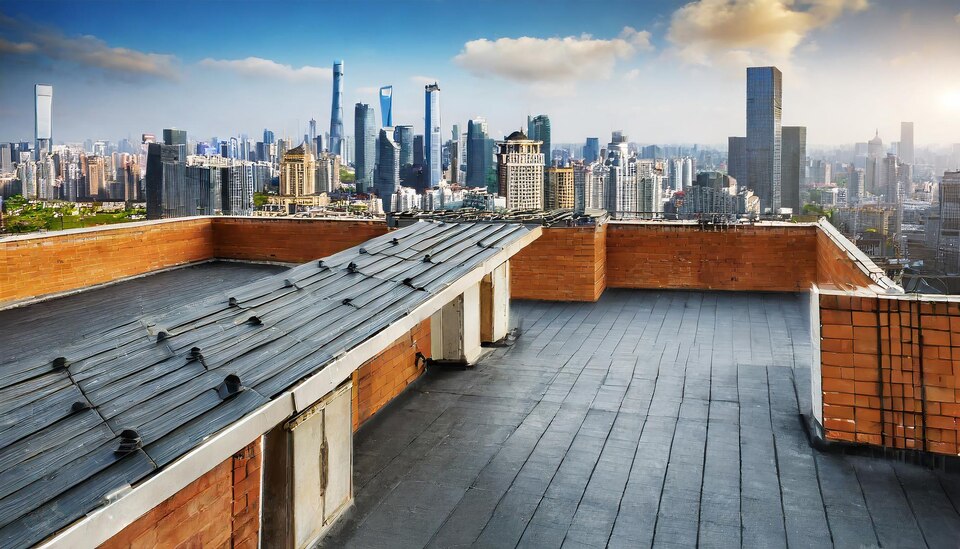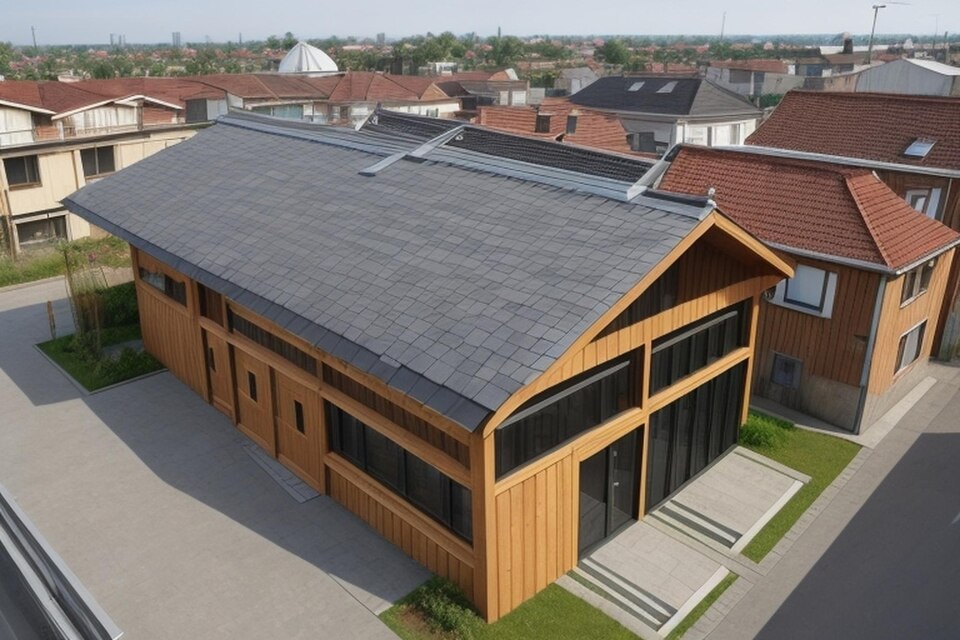When it comes to commercial roofs, choosing the best flat roof material is crucial for durability, energy efficiency, and overall cost-effectiveness. With a plethora of options available, it’s essential to understand the pros, cons, and costs associated with each type of material.
In this comprehensive guide, we’ll explore some of the best flat roof materials for commercial properties. We’ll delve into the costs of each material, followed by a detailed breakdown of the pros and cons, helping you make an informed decision for your roofing needs.
1. TPO (Thermoplastic Olefin)
TPO roofing is a single-ply roofing membrane made from a blend of polymer materials, typically ethylene-propylene rubber and polypropylene. It has gained popularity in commercial roofing due to its versatility, energy efficiency, and durability.
Why Choose This: TPO roofing offers excellent UV resistance, making it one of the best flat roof materials for sunny climates. Its reflective properties reflect sunlight, reducing heat absorption and cooling costs. TPO is available in a range of thicknesses and widths, providing options to suit various roofing needs.
| Pros | Cons |
| TPO roofs are highly reflective, reducing heat absorption and lowering cooling costs. They are resistant to UV radiation, punctures, and weathering, ensuring a long lifespan. TPO roofs require minimal maintenance due to their strong, durable nature. | While durable, TPO can be punctured by sharp objects if not handled carefully. Inconsistent quality among manufacturers can affect the performance and longevity of TPO roofs. TPO roofs may develop tears over time, especially in areas with frequent temperature fluctuations. |
2. EPDM (Ethylene Propylene Diene Monomer)
EPDM roofing is a rubber membrane that consists of synthetic rubber derived from oil and natural gas. It’s known for its durability, flexibility, and affordability.
Why Choose This: EPDM roofing is available in large rolls, making it easy to install and minimize seams. Its flexibility allows it to expand and contract with temperature changes without compromising its integrity. EPDM is compatible with various roofing systems and can be mechanically attached, fully adhered, or ballasted.
| Pros | Cons |
| EPDM is affordable both in terms of material and installation costs. It can withstand UV radiation, extreme temperatures, and various weather conditions. EPDM roofs have a lifespan of up to 30 years when properly maintained. | EPDM may shrink over time, causing seams to pull apart and leading to leaks. Sharp objects can puncture the membrane, leading to leaks if not addressed promptly. Dark-colored EPDM roofs can absorb heat, increasing cooling costs in warmer climates. |
3. PVC (Polyvinyl Chloride)
PVC roofing is a single-ply membrane made from a thermoplastic polymer known as polyvinyl chloride. It’s recognized for its strong performance, durability, and energy efficiency. It wouldn’t be wrong to say that PVC is one of the best flat roof materials for commercial properties.
Why Choose This: PVC roofing has heat-welded seams, providing a watertight bond that prevents leaks. Its reflective surface reduces heat absorption, making it energy-efficient and suitable for hot climates. PVC membranes are also resistant to chemicals, making them a good choice for roofs with potential exposure to pollutants.
| Pros | Cons |
| PVC roofs are strong and durable, capable of withstanding chemicals, UV radiation, and weathering. They have reflective properties, reducing heat absorption and energy costs. PVC requires minimal maintenance and is resistant to mold, mildew, and debris. | PVC roofing can be more expensive upfront than some other materials. Sharp objects can cause tears in the membrane, leading to leaks. Proper installation requires skilled professionals, which can increase costs. |
4. Modified Bitumen
Modified bitumen roofing is an evolution of traditional asphalt roofing. It’s created by adding modifiers like atactic polypropylene (APP) or styrene-butadiene-styrene (SBS) to the asphalt.
Why Choose This: Modified bitumen is typically installed in multiple layers using heat to fuse the layers together. It combines the benefits of built-up roofing with modern technology. APP-modified bitumen is torch-applied, while SBS-modified bitumen is typically applied using hot asphalt or cold adhesive.
| Pros | Cons |
| Modified bitumen can be applied using various methods, including torch-applied and self-adhesive. It has excellent resistance to water, UV radiation, and extreme temperatures. Modified bitumen is relatively easy to repair if damage occurs. | Installation can be more intricate, requiring skilled contractors. Seams can become a weak point if not properly sealed, leading to leaks. Sharp objects can puncture the membrane, causing damage. |
5. Built-Up Roofing
Built-up roofing (BUR), often referred to as “tar and gravel” roofing, has been a reliable choice for commercial properties when dealing with the subject of the best flat roof material for over a century.
Why Choose This: BUR consists of multiple layers of bitumen and reinforcement materials, usually felt or fiberglass, built up roofing to create a waterproof barrier. The top layer is finished with gravel or a reflective coating. BUR is suitable for flat or low-slope roofs and is known for its durability.
| Pros | Cons |
| Built-up roofing is a time-tested option known for its durability and longevity. Materials for built-up roofing are relatively low-cost compared to some alternatives. The multiple layers in built-up roofing provide good insulation and thermal performance. | Built-up roofing can be heavy, potentially requiring additional structural support. Installation involves layering materials, making it labor-intensive and time-consuming. Seams and laps can be potential points of weakness if not properly sealed. |
6. Metal
When it comes to the best flat roof material, metal roofing is a versatile and durable option for commercial properties. It includes materials such as aluminum, steel, and copper.
Why Choose This: Metal roofs are available in various styles, including standing seam, corrugated, and flat-seam panels. They can be installed over existing roofing materials or as part of new construction. Metal roofing offers longevity, energy efficiency, and a modern aesthetic.
| Pros | Cons |
| Metal roofs can last 40-70 years or more with proper maintenance. Reflective coatings make metal roofs energy-efficient and reduce cooling costs. Metal roofing comes in various styles, colors, and finishes to match architectural preferences. | Metal roofing can have a higher upfront cost compared to other materials. Rain and hail can create noise on metal roofs without proper insulation. Metal roofs expand and contract with temperature changes, potentially causing noise and stress on fasteners. |
Cost of the Best Flat Roof Material
The cost of choosing the right flat roofing material for your commercial property is a crucial aspect to consider. The initial investment varies depending on the material’s durability, lifespan, energy efficiency, and installation complexity. Here’s a breakdown of the cost ranges for some of the best flat roof materials commonly used in commercial roofing:
| Material | Cost |
| TPO | $5 to $8 per square foot |
| EPDM | $4 to $7 per square foot |
| PVC | $6 to $9 per square foot |
| Modified Bitumen | $3 to $6 per square foot |
| Built-Up Roofing | $4 to $7 per square foot |
| Metal | $7 to $12 per square foot |
Turn to Apex for Roofing Solutions
In need of roof repair or replacement in NJ? Don’t be afraid to turn to Apex Commercial Roofing LLC as we use the best flat roof material for your commercial property. Consult us today for 360-degree roofing solutions.
Contact Us for more details.
Visit Apex Commercial Roofing LLC at Our Cherry Hill Location
811 Church Rd #105,
Cherry Hill, NJ 08002,
United States
For professional roofing services, including commercial metal roof repair, we invite you to stop by or reach out to us. Our expert commercial roof contractors are here to provide reliable solutions tailored to your needs.







